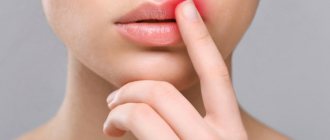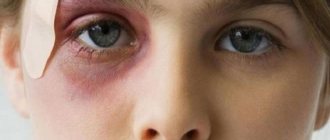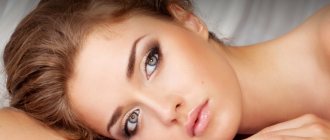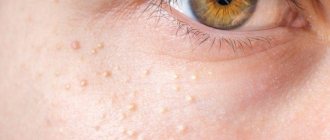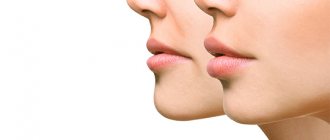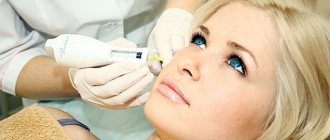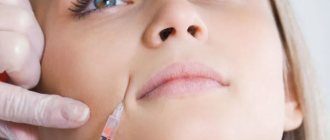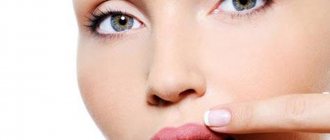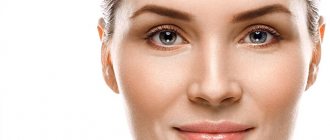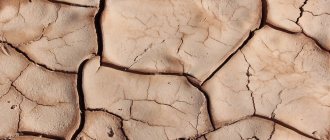Even the procedure of saturating your lips with hyaluronic acid, carried out in an aesthetic medicine clinic, can have side effects. Unfortunately, if you want to give your lips an attractive swelling and additional volume, you need to be prepared for such sacrifices and understand how to reduce swelling after lip augmentation.
Hyaluronic acid actively fills the subcutaneous layers, saturates the lips with moisture, vitamins and nutrients. The life-giving cocktail of the composition not only heals the epidermis and increases the size of the lips, at the same time it stimulates the production of natural hyaluronic acid, which is contained in our body. The rejuvenation process begins not only in the injection area, but also next to the injection area.
Treatment of hematomas on the face
Since childhood, each of us remembers that if there is a bruise, it is better to apply something cold, then the black eye will be smaller. Ice is your universal assistant. By narrowing the lumen of the capillaries, it prevents the appearance of hematomas and, of course, reduces pain.
It is not recommended to apply ice directly to the damaged area. You should wrap it in cloth. For example, gauze. Direct contact of ice with the lip can cause local frostbite and damage to the delicate epithelium of the lip. This method is not so effective, but it is handy and very convenient.
Your sleep plays a significant role. Namely, how you sleep. Try not to lie down in the first hours after the procedure. After some time has passed, you are allowed to sleep, but just do not forget to put a couple of pillows so that the level of your head is as high as possible.
When is a visit to the doctor inevitable?
You should not hesitate if you are concerned about the severity of swelling within 10-12 days after the end of the lip augmentation event.
You should immediately consult a doctor even if there is no dynamics in the decline of swelling, when swelling after lip augmentation only increases, since this is not considered normal.
It wouldn’t hurt to consult an allergist to rule out or confirm lip swelling caused by allergic susceptibility to the ingredients in the filler.
It is necessary to consult a doctor due to the appearance of local elevated temperature, pain, hyperemia - overflow of blood vessels. This indicates infection has entered the injection area.
Duration of swelling
Typically, swelling after lip augmentation with hyaluronic acid persists for 2-3 days and subsequently disappears. A period of 3-5 days is also considered standard, which is explained by the individual characteristics of the patient.
When asked how to relieve swelling after lip augmentation with hyaluronic acid, the specialist will answer the consultation at the end of the procedure. The doctor will inform the patient about methods and means that:
- will quickly relieve swelling;
- will allow hematomas to disappear if they form;
- will help not lead to allergic reactions or infections in the event area.
The swelling will subside in time if you follow the rules recommended by the specialist after lip augmentation.
You can reduce the time it takes to get rid of swelling on your lips by lubricating them with Troxevasin gel (Bulgaria) 2 times a day. The pharmaceutical drug will strengthen the walls of blood vessels, prevent fluid from accumulating in the tissues, and reduce inflammation.
The following gels have similar properties: “Lioton” (Germany), “Troxerutin” and “Troxevenol” (Russian Federation), “Venoruton” and “Venorutinol” (Switzerland), “Troxegel” (Ukraine).
Gel with bodyaga has the property of dissolving. It is also used as an antiseptic drug to reduce irritation and swelling of soft tissues.
To do this, ice from the freezer is placed in a bag and wrapped in a sterile cloth. At home, it is permissible to replace such a cold lotion with food frozen in a bag, wrapped in a sterile cloth napkin.
The use of a compress from a decoction of herbs such as chamomile, marigold, string, and walnut leaves helps reduce swelling on enlarged lips immediately after the procedure. Tea lotions made from black/green tea will also help.
Instead of ice, use chilled spoons. 3-4 tbsp. l. Cool either in the freezer or in a glass with ice, placing them in the chosen environment until they become cold.
1 spoon is applied to the lips and held until it becomes warm. This will take a few minutes, after which the cutlery should be changed to cooled one.
Below are some other ways to reduce swelling:
- An unmistakably chosen filler will help remove swelling faster. The leader in the list of fillers with hyaluronic acid is Juvederm. Non-sulfonated glycosaminoglycan (as GA is scientifically called) is of non-animal origin. This reduces the patient’s risk of an allergic reaction and adverse events in the form of heterogeneous distribution of filler in the tissues. Juvederm contains lidocaine - a substance that transforms pain during surgery into a less noticeable one, minimizing tissue injury.
- It is possible to shorten the duration of edema and reduce swelling by dieting 2-3 days before and after surgery. The diet excludes the consumption of canned food, salted and smoked fish, sausages, cheeses, hot and spicy dishes, and alcoholic beverages. Hot soups, drinks, and solid foods are prohibited due to possible injury or irritability of the epidermis in the problem area.
- Antihistamines are included in the arsenal to combat swelling. By taking them, you will be able to speed up the disappearance of swelling and eliminate the possibility of symptoms of excessive sensitivity to the ingredients of the filler. Among the antihistamines is Suprastin. After injection with it, the swelling decreases due to the neutralization of the allergic reaction.
#10 prohibitions when swelling occurs
After increased lip plumpness performed by contour surgery, the following measures cannot be carried out until the skin tissue is restored:
- professional and other massages of various types, unless they are recommended by a specialist;
- touching your lips with your hands and near them;
- heavy physical activity;
- going to baths, saunas, staying in a solarium, training in a gym, fitness club;
- drinking strong alcoholic drinks;
- smoking to avoid infection in the injection area;
- use of decorative cosmetics;
- use of scrubs and peelings;
- waxing;
- visits to the dentist in the first 14 days after injections.
You should avoid kissing for this time and forever give up the habit of biting or licking your upper or lower lip. This will only increase swelling and cause bruising.
Helps relieve swelling in a timely manner and minimize the contact of damaged skin with food, since it prevents the provocation of unnecessary irritation and infection.
Do not epilate this area if your lips are swollen. It is also worth holding off on visiting the dentist.
Dermatologist Emily Altman
Consequences of lip augmentation
Despite the numerous advantages of the procedure, it has its side effects. We are talking about the following manifestations:
- Pain. Lasts for 1-2 days after the procedure. Swelling and swelling. They are a common reaction to injections and are accompanied by redness. Sometimes swelling is caused by the administration of an excessive volume of the drug and an unsuccessful lip augmentation procedure. They bother the patient for 3-7 days. Dehydration of lips. It causes excessive dryness of the skin. Bruises and hematomas. Most often they occur due to improper injection of filler. They are especially common in girls who smoke. Bruises disappear in 1-2 weeks. Lumps and lumps. They appear due to drug rejection, insufficient depth of hyaluronic acid treatment, and decreased immunity.
The severity of side effects is influenced by the following factors:
- specialist experience; filler quality; individual characteristics of the body; compliance with doctor's recommendations and contraindications.
The result will be beautiful if the doctor follows the rules of injection, and the patient takes the doctor’s recommendations seriously during the recovery period.
Useful tips
To avoid serious complications and shorten the rehabilitation period, it is important to adhere to the following recommendations regarding the preparatory period:
- Do not take blood thinning drugs;
- It is forbidden to drink alcohol a couple of days before lip augmentation;
- You should not give injections during menstruation.
Subsequently, the following conditions must be met:
- you need to protect yourself from sunlight;
- before going outside in hot weather, you should lubricate your lips with hygienic balm;
- you should not go to the bathhouse and touch your lips with dirty hands;
- You should not engage in active sports in the first days after the procedure;
- chapping of the skin should not be allowed;
- For a couple of weeks you need to forget about lipstick.
In the future, it is useful to lubricate your lips with special nourishing creams.
How to remove bruises after hyaluronic acid injections using traditional methods
Bruises after injections of hyaluronic acid can be removed not only with the help of pharmaceutical products, but also with homemade recipes, quick and easy to prepare:
Compress with potato juice. Grate several medium-sized potatoes until they become a paste, then apply the paste to the desired area for 2-3 hours.
This will help cope with side effects after lip augmentation or correction of wrinkles on the skin under the eyes.
- Garlic tincture. To remove a bruise, you need to rub a few cloves on a fine grater and add table vinegar (100 ml), let it sit for a day and, when ready, rub the bruise 2-3 times daily until it is completely removed.
- Salt solution. Add 1 large spoon of salt to a glass of warm water, place a cloth in the mixture and apply it to the affected area, securing it with something on the skin. The compress should be renewed every 2 hours. Also suitable for quick recovery after a hematoma on the lip.
Watch this video about how to remove a bruise after injection procedures using traditional methods:
What to apply if you have herpes
Sometimes after the injection, herpes appears on the lips. Viral rashes prevent the normal absorption of hyaluronate and its distribution in tissues. In this case, the doctor prescribes anti-herpes medications. These include:
- Acyclovir;
- Valacyclovir;
- Panavir;
- Zovirax;
- Gerpevir;
- Groprinosin.
Treatment also includes treatment with antiseptic drugs and immunomodulatory medications.
Possible side effects
The choice of drugs for subcutaneous injections should be approached taking into account their characteristics. The quality of fillers with hyaluronic acid depends on the degree of its purification. It is known that hyaluronic acid, which is of animal origin, has the most pronounced allergic effect, one of the manifestations of which is swelling at the injection site.
All side effects that occur after injections of hyaluronic acid vary in duration and degree of complication.
Among the short-term side effects after injections, the most common are:
- Feeling of discomfort after injection;
- Pain at the injection site of the filler;
- Swelling, redness, cyanosis of the skin;
- Possible hematomas;
- Point necrosis at the injection site.
Short-term complications that are undesirable in nature vary according to the following characteristics:
- The injected substance is visible in the subcutaneous layer - it appears as a pale or white lump.
- Formation of subcutaneous nodes and swelling at the injection site;
- An allergic reaction caused by individual hypersensitivity to the constituent components of the drug.
Very rarely, more serious adverse events are observed, the connection of which with the procedure is conditional. The fact is that, based on the absolute safety of injectable drugs used in contouring, it is very difficult to associate rare manifestations of negative effects with the use of dermal fillers.
Each filler is accompanied by detailed instructions on how to properly insert it under the skin. Strict adherence to these rules will reduce the possible risk of unpleasant complications.
The most common adverse events accompanying a course of plastic surgery using hyaluronic acid injections include:
- Headache;
- Allergic sinusitis;
- Signs of respiratory disease.
These manifestations themselves may be symptoms of a mild respiratory or infectious disease.
In patients who are particularly sensitive to pain, the appearance of headaches is typical as a response to injections.
The most serious, although rare, complication after injection of fillers is a necrotic reaction at the injection site and paralysis of the facial nerve. It is impossible to establish the cause of paralysis, given isolated cases of its occurrence. Necrosis of points after injections also occurs extremely rarely and is easily treated.
Bruising After Filler and Botox Injections: How to Prevent
A bruise (hematoma) is an area of discolored skin that occurs when small blood vessels puncture and leak their contents into the soft tissue under the skin. Bruising is more common in people who have received large volumes of contouring fillers in the lips, cheeks and under the eyes.
How to prevent bruises?
Tip: Before the procedure, always remind the doctor where you had big bruises last time, so that he can be careful and avoid these areas if possible. Patients often develop bruises in a specific location.
You can also come a little earlier than the time appointed for the procedure and ask to sit somewhere quietly for a few minutes, applying ice to your face.
Do not take blood thinning medications
Using blood thinners or medications before an injection increases the risk of developing hematomas and affects their severity.
It is important to tell your doctor if you are taking blood thinning medications such as pain relievers. If aspirin is not needed as a medication, it should be stopped for one week before any injection procedure.
Avoid (if possible) the use of nonsteroidal anti-inflammatory drugs (NSAIDs, such as ibuprofen and its analogues) for five days before any procedure. Alcohol slows down blood clotting and thereby increases the risk of bruising.
Many herbal supplements and vitamins have the potential to increase the risk of bruising, especially high doses of vitamin E, ginkgo biloba and garlic. Stop taking these products two weeks before your procedure.
Cool your skin
Cold compresses may be used before the procedure to encourage blood vessels to constrict and reduce the risk of bruising.
After the procedure
Pressure: Immediately after the injection, apply pressure to the area of skin for several minutes. However, at a later stage, after the procedure, it is best to avoid pressing on the face. You can also use cold compresses to stimulate vasoconstriction and reduce bruising.
Eating: When you think about food, there is a relative constriction of the skin vessels as blood moves to the gastric system in anticipation of eating. This narrowing of the skin vessels may result in minimal bruising.
High temperatures: After the procedure, do not use the sauna or take hot baths to avoid bacteria and dilation of blood vessels.
Sunlight: It is always important to protect your skin from the sun, but after the procedure you should avoid excessive exposure to sunlight and UV lamps. Sports: Try to avoid heavy lifting and extreme sports immediately after the procedure
Exercising increases blood pressure and circulation
Sports: Try to avoid heavy lifting and extreme sports immediately after the procedure. Exercising increases blood pressure and circulation.
Rubbing: It is not recommended to rub the injection site of Botox and Dysport or Juvederm, Restylane and Radiesse. However, it is recommended to massage such areas after Sculptra.
What bruises look like after injections
Here are some photographs of patients:
Bruise on upper lip
Terrible bruises after injection of filler into the chin area
One day after lip augmentation with Juvederm
What to do if bruises still appear
Even if you followed our advice and were treated by an experienced doctor, you may still experience bruising. In the worst-case scenario, the bruise will turn yellow within 72 hours and completely disappear within 14 days.
Ice packs
Apply ice wrapped in a towel to the injection site (alternatively, use bags of frozen peas).
Sleep correctly
Some doctors recommend not lying down for the first few hours after injections and placing one or two pillows under your head the first night to elevate it higher.
Hiding bruises with makeup
Immediately after the procedure, you can use a cosmetic pencil to disguise the bruises. Small bruises can be hidden using foundation, but more noticeable ones will have to be masked using the first method, and then applying foundation. Below is a list of some popular brands of concealer pencils and tips for using them.
Question answer
In order not to reduce the expected effect and not to aggravate the feeling of pain, eating is allowed 4-6 hours after returning home from the clinic. The menu consists of soft dishes. They do not require vigorous mouth movements. Until the swelling disappears from the mouth, the consumption of hot, salty, spicy and smoked foods is limited.
You need to know that the effect of the event is supported by lip correction. Then the contour will look smooth and neat. The short-term preservation of the results of manipulation is explained by the fact that hyaluron dissolves after a while, and the lips take on their previous appearance. A repeat visit to a cosmetologist a year later will preserve the beauty of your face. By adhering to the recommendations, the patient will maintain the beauty and youth of his appearance.
This is a painful manipulation, after which swelling will persist for 2-3 days. If you wish to undergo lip augmentation, you will need to wait a week after the filler is removed.
